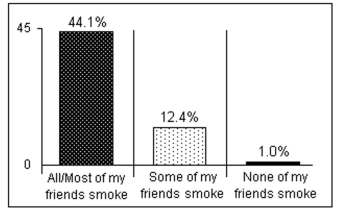A youth prevention organization is examining the effect of peer pressure on the decision of teenagers to smoke.
A survey of 97 teenagers, ages 11 to 17 years who smoked in the last 30 days, was conducted. The random
sample consisted of 25 teenagers who said all/most of their friends smoke, 40 who said some of their friends
smoke, and 32 who said none of their friends smoke. The results are shown in the figure. At α = 0.01, can you
support the organizationʹs claim that the proportion of teens who decide to smoke is lower when none of their
friends smoke? How Friends Affect Youth Smoking
Percentage of 11-17-year-olds who smoked a cigarette at least once in the past 30 days.
Source: Philip Morris USA Youth Smoking Prevention. Teenage Attitudes and Behavior Study. 2002.
Definitions:
Q6: A survey of 400 non-fatal accidents showed
Q15: A researcher wants to determine whether
Q18: A sports researcher is interested in
Q40: The distribution of cholesterol levels in
Q42: Four different types of fertilizers are
Q55: Find the z-scores for which 98% of
Q61: If Data A has a correlation coefficient
Q74: The data below are ages and
Q80: Construct a 99% confidence interval for
Q112: Given a sample with r =